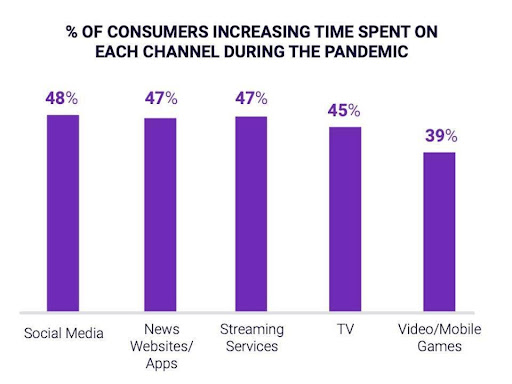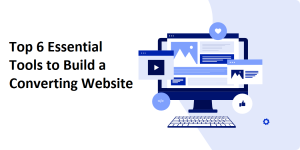Businesses build websites to generate leads and have better conversions. However, there is no denying that content consumption has increased to an all-time high over the past few years. According to Forbes, the percentage of customers spending time on different channels like social media, news websites, and others has risen by more than 40%.

Due to higher content consumption, businesses are now looking to build engaging websites to capitalize on the trend. However, without proper optimizations, it is not easy to have higher conversion rates.
Here, the right website tool can make the difference by offering optimizations and insights into what you need for better conversion rates. We will discuss some of the best tools for your website optimization, but first, let’s understand conversion rates.
What are Conversion Rates?
Conversion rates are the percentage of users that took a specific action. This particular action can be,
- Downloading content like ebooks, whitepapers, and more
- Clicking on the Call to Action button
- Subscription of the newsletter or other services(paid or free)
- Submitting web forms
- Making a purchase
- Taking a survey
- Upgrading from one service to another
- Requesting more information about B2B product or service
A simple way to calculate the conversion rate for any website is,
Conversion Rates = Total number of conversions or action is taken/ Total number of users that visited the website * 100
Here engagement is an essential factor as it can help you with more conversions. First, however, you need excellent website tools to build an engaging site. So, let’s start with the best tools to use for your website.
Top Website Tools For Your Business
Building websites need tools that offer essential services like hosting or others and provide advanced features and analytics.
#1. WordPress
WordPress is one of the most popular website tools worldwide, with 35% internet-powered through its services. In addition, it offers several themes and plugins to create unique websites with advanced functionality. You can easily create an essential website for free with WordPress themes and plugins.
However, you may need paid plugins for complex functionalities like multi-language support, payment gateway integration, and even custom feature development. On the technical side, WordPress is a content management system(CMS) with PHP at its core that uses a MySQL database. Whether your blog or an enterprise website, it helps build websites of all sizes and scales.
WordPress pricing is also quite competitive, with a base plan starting at $4 per month that offers 6GB worth of cloud storage. The most premium plan goes up to $25, allowing website customizations through different theme options and plugin integration.
It should be noted that creating a WordPress website requires significant coding chops. If you lack them, you’ll want to check out the next tool.
#2. Elementor
Elementor is one of the most popular website builders on the planet. Empowering anyone to create a stunning WordPress website, Elementor spowers close to 6.5% of all the world’s websites. What sets Elementor apart is its ease of use. Ordinarily, a pretty challenging task, building a WordPress website with Elementor’s intuitive drag-and-drop editor is an effortless, streamlined affair.
If you’re feeling creative, you can leverage Elementor’s Hello Theme and create your website from scratch. Alternatively, you can opt for Full Site Kits. Fully-designed, functional WordPress websites, Kits is one of Elementor’s newest features. You can choose from a wide array of website niches (e.g. eCommerce, tech), quickly customize it to fit your style and brand and hit publish.

If you have your heart set on creating a WordPress-based online store, Elementor should be your go-to platform. With more than 20 widgets designed specifically for eCommerce use cases, you can create a dynamic and comprehensive WooCommerce website with Elementor’s WooCommerce website builder.
Elementor offers more than 40 free widgets for your website building process and allows you to change default stylings like fonts or colors. Elementor also offers cloud-based hosting services, which include security features like SSL certification.
SSL or Secure Socket Layer is a process of securing the connection between browsers and the user’s device for secure data exchange. You can also opt for SSL certificates from top security solutions if not offered pre-built with your hosting solution. This is essential as default hosting services may not necessarily provide advanced SSL certificates that others present in the market offer.
#3. Figma
User Interface or UI is one of the most significant aspects of website building as it enables businesses to engage with customers and provide an excellent user experience. Figma is one website tool that can help you with excellent sketching and designing features.
It is a cloud-based design tool that also offers fantastic collaborative features. Figma makes the entire design process with compelling features like add-ons, custom APIs, and more. So, you can integrate any add-on functionality without the need for third-party APIs.
Figma also allows collaborators and designers to have real-time reviews for quick changes. This will enable you to reduce errors in design layouts and bring agility to your UI design process.
#4. Hotjar
Website visualizations are essential for your business as you can understand how users engage with your site. Hotjar is one website tool that helps with interactive heat maps that record each click and action per session. It also gathers information through surveys and feedback and creates insights for your website to leverage for improvements.
With Hotjar, you can have,
- User action Heatmaps
- Website visitor recordings
- Conversion funnel insights
- Analysis of the forms submitted
- User feedback
#5. Adobe illustrator
Adobe Illustrator is another website tool that helps with exquisite UI designs. You can leverage it for designing vectors and top-notch interface designs. Illustrators enable the creation of everything related to design like posters, logos, symbols, patterns, layouts, icons, etc.
Adobe Illustrator is a far more comprehensive website tool due to its compatibility with other platforms, primarily in the Adobe ecosystem. So, you can easily leverage different tools from Adobe like photoshop, illustrator, and others together for website building.
#6. Boxmode
If you are looking for readily available templates for your website or if you are just starting out, Boxmode is another great tool to consider. Boxmode is a comprehensive website builder that you can use for free to build custom websites quickly.
This all-in-one toolkit comes with all the features you may need to create a beautiful and performance-driven website in your niche. With its drag-and-drop features, numerous templates for every industry, and built-in SEO and analytics tools, this is a great solution for creatives, web developers, but also business leaders.
The best part? – you don’t need to have any experience with website building to be able to create your first site with Boxmode.
Conclusion
Website conversion rates can be high if you have planned your entire site well and built it with exquisite features. This is possible with website tools that not only enable excellent UI generation but also support the backend.
For example, features like the instant review of front-end changes that do not affect the backend can be excellent for many businesses. It allows high availability of the current services. So, choosing a tool that can offer such features is quite essential for higher conversion rates.
The post Top 6 Essential Tools to Build a Converting Website appeared first on ReadWrite.


Comentarios recientes